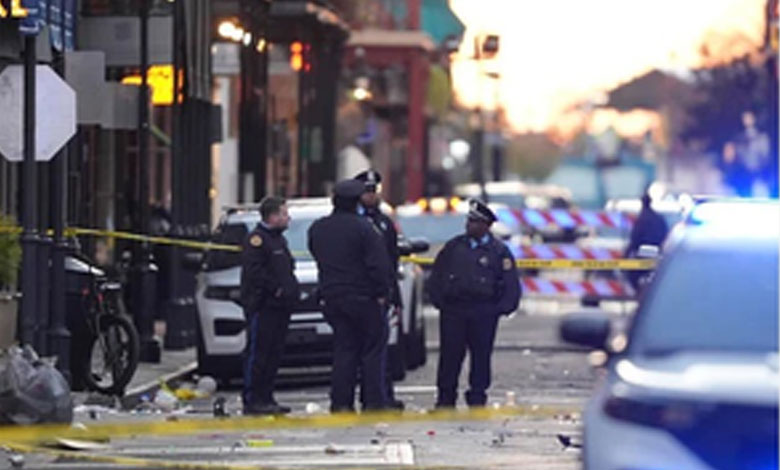The Third Eye of Terror: Why No One Saw the New Orleans Attack Coming
A devastating terror attack on New Year's Day in New Orleans has reignited concerns about global Islamic radicalism. The attack, carried out by ISIS convert Shamsuddin Jabbar, highlights the persistent threat of sleeper cells and lone-wolf terrorists operating worldwide.

New Delhi: A devastating terror attack on New Year’s Day in New Orleans has reignited concerns about global Islamic radicalism. The attack, carried out by ISIS convert Shamsuddin Jabbar, highlights the persistent threat of sleeper cells and lone-wolf terrorists operating worldwide.
The incident took place on Bourbon Street, where Jabbar, a Texas-born former U.S. Army Staff Sergeant, launched a violent assault using a rented pickup truck, automatic weapons, and explosives. The attack killed 14 people and injured 35 others, shaking the nation and drawing strong reactions from U.S. leadership.
Table of Contents
Biden Visits New Orleans as Trump Faces Rising Security Challenges
Given the gravity of the attack, U.S. President Joe Biden and First Lady Jill Biden visited New Orleans to meet with victims’ families. Meanwhile, the attack poses a major geopolitical challenge for President-elect Donald Trump, as intelligence reports indicate that radical networks remain active within U.S. borders.
Key Developments Raising U.S. Security Concerns
1. Growing Radicalization and FBI Surveillance
Reports suggest that multiple terror suspects were already under FBI surveillance in recent months, demonstrating the ongoing threat of homegrown radicalism. Cyber channels and social media have been exploited by terror groups to indoctrinate vulnerable individuals.
2. An Army Veteran Turned ISIS Terrorist
Jabbar, a former U.S. Army veteran, served in Afghanistan and remained in active service until 2015 before resigning in 2020. His case underscores that radicalization can affect educated individuals, not just marginalized youth. Financial troubles following his divorce may have contributed to his vulnerability to extremist ideology.
Jabbar pledged allegiance to ISIS in a pre-attack video and was found with an ISIS leaflet in his truck. His admiration for ISIS, rather than Al-Qaeda, suggests the terror group remains the dominant face of global jihadist movements.
3. ISIS’ Tactical Shift & Rising Global Attacks
The New Orleans attack followed the well-known ISIS modus operandi—a combination of vehicular attacks, indiscriminate shootings, and planted explosives. Notably, Jabbar failed to detonate two IEDs before being neutralized by law enforcement.
ISIS-K, the group’s Central Asian faction, recently executed a deadly terror attack in Moscow, killing 130 people. This incident, along with the New Orleans attack, signals ISIS’ continued expansion and global reach.
Geopolitical Ramifications: U.S., Middle East & Global Security
The U.S. War on Terror and Its Unfinished Battles
Despite the U.S. withdrawal from Afghanistan in 2021, radical groups like ISIS and Al-Qaeda have regained ground. Pakistan’s role in brokering Taliban’s return to power in Kabul has further complicated the security landscape.
Also Read: Secret Talks in Doha – Will Hamas Agree to Release Israeli Hostages?
The attack also reignites debates about U.S. Middle East policies, including:
- Iran’s support for radical groups like Hamas.
- Saudi Arabia’s close U.S. alliance, making it a target for extremists.
- Russia and China’s alignment with Syria’s Assad regime, fueling conflicts with ISIS.
Trump’s Strategy: How Will the U.S. Respond?
With Donald Trump set to take office, his administration is expected to adopt a tough stance on radical Islamic terrorism. Early indications suggest:
- A stronger crackdown on domestic extremism.
- Reevaluation of U.S. counterterrorism policies in the Middle East.
- Possible cooperation with India on counterterrorism strategies.
India’s Perspective: Strengthening Indo-U.S. Security Ties
As one of the world’s largest democracies, India has long faced terrorism threats from the Sino-Pakistani axis. With Chinese drones aiding Pakistan’s arms and narcotics smuggling into Punjab and Kashmir, India remains on high alert.
A Trump administration may work closely with India on intelligence-sharing, cybersecurity, and counterterrorism strategies, strengthening the strategic Indo-U.S. partnership.
Future of Global Security: New Challenges & Alliances
The New Orleans attack reinforces the evolving nature of terrorism—from asymmetric warfare to cyber radicalization. Governments worldwide must adapt to new threats, including:
- Deepfake propaganda and online extremism.
- Use of AI in terrorist recruitment and planning.
- Growing threats from non-state actors in proxy wars.
As the world braces for a new era of geopolitical realignments, nations must unite against common threats—terrorism, human trafficking, and cyber warfare. The U.S. and India could emerge as key players in this global fight.
